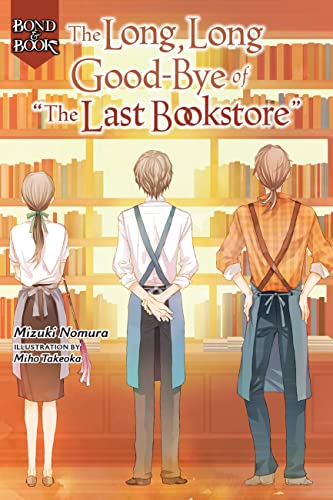By Mizuki Nomura and Miho Takeoka. Released in Japan as “Musubu to Hon: “Saigo no Honyasan” no Nagainagai Owari” by Famitsu Bunko. Released in North America by Yen On. Translated by Nicole Wilder.
If you are reading and enjoying Bond & Book, as well as the author’s prior series Book Girl, then I am going to assume that you are a fan of books. Not just “Oh hey, I like reading” or “I always get the new release of Index when it comes out”, but someone whose entire life is tied up in reading and the titles that have impacted them. Certainly this series is both about and for those people, and while it takes the time to explain the books that it focuses on, there’s a greater depth if you’ve already read the stories in question. Not that I expect too many light novel readers will rush out to buy The Field Guide to Extinct Animals, but certainly The Seagull and The Scarlet Letter are very important to this volume, and being familiar with both stories lends them an added emotional impact. Which is surprising, as the author already knows how to pack quite an emotional punch without the references.
After introducing us to what seemed like our main cast in the previous book, this volume sees Musubu on his own. the reason for that is that he’s gone to a distant town where the bookstores have been shutting down one by one. Only one is left now, and its owner just died in what was seemingly a tragic accident. Now it too is going to close, and Musubu is there to make sure that the books are cared for in their final days there. This irritates Minami, the bookstore’s longest-serving part-timer, who not only felt a close kinship with the former owner but is creeped out by this teen who says that he can talk to books – and they talk back. As the days pass and the closing of the bookstore becomes a major event in the town, will we find out about the owner’s past history and secrets?
Unlike the first volume in the series, this one is more of a novel than a short story collection – in fact, the afterword makes me think the author wrote this one first. It overflows with the love that you can get from reading a beloved book, and how that love can also lead to different things. A couple who loved each other from afar when they were teens reunite years later thanks to The Tomb of the Wild Chrysanthemum. A boy who has become terrified of earthquakes is given a fun series about aliens to read that will calm his mind. And, in the main plotline, an actress and a writer both have ties to this bookstore and its owner, and they’re more than just the Chekhov and Hawthorne stories that wrap around their lives. The ending of the book is incredible, wringing emotions out of you, and making you think that, years from now, maybe Bond and Book will be the series that lodges itself in your heart.
There’s two more volumes out in Japan, and this delights me. I just want to read more from this author, whatever it is. And I want to go back and re-read The Seagull. (Not The Scarlet Letter, though. Sorry, Nomura-san, your work can only take me so far.)


